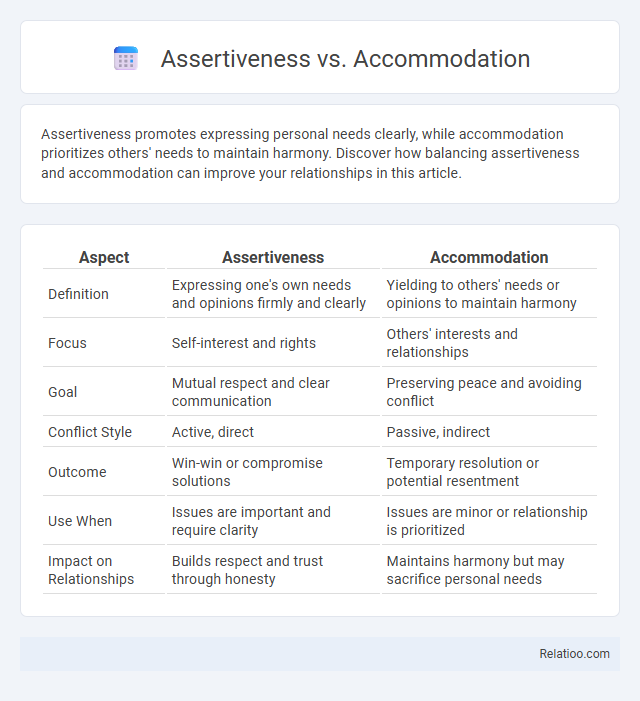Assertiveness promotes expressing personal needs clearly, while accommodation prioritizes others' needs to maintain harmony. Discover how balancing assertiveness and accommodation can improve your relationships in this article.
Table of Comparison
| Aspect | Assertiveness | Accommodation |
|---|---|---|
| Definition | Expressing one's own needs and opinions firmly and clearly | Yielding to others' needs or opinions to maintain harmony |
| Focus | Self-interest and rights | Others' interests and relationships |
| Goal | Mutual respect and clear communication | Preserving peace and avoiding conflict |
| Conflict Style | Active, direct | Passive, indirect |
| Outcome | Win-win or compromise solutions | Temporary resolution or potential resentment |
| Use When | Issues are important and require clarity | Issues are minor or relationship is prioritized |
| Impact on Relationships | Builds respect and trust through honesty | Maintains harmony but may sacrifice personal needs |
Understanding Assertiveness and Accommodation
Understanding assertiveness involves expressing your thoughts and needs confidently and respectfully, ensuring clear communication without aggression. Accommodation focuses on yielding to others' preferences to maintain peace, often prioritizing relationships over personal desires. Balancing assertiveness and accommodation is key to achieving harmony in interactions, allowing you to respect both your own rights and those of others.
Defining Assertiveness: Key Traits and Behaviors
Assertiveness is characterized by confidently expressing your thoughts, feelings, and needs while respecting others' rights and opinions. Key traits include clear communication, self-assurance, and the ability to set boundaries without aggression or passivity. Cultivating assertiveness enhances interpersonal relationships by balancing honesty and respect in interactions.
The Concept of Accommodation in Communication
The concept of accommodation in communication involves adjusting one's speech, behavior, or strategies to align with others, fostering understanding and relational harmony. Accommodation promotes effective interaction by reducing potential conflicts and facilitating cooperation, especially in diverse or sensitive contexts. This adaptive approach balances assertiveness and harmony by prioritizing the relational goals over personal dominance, enhancing mutual respect and social cohesion.
Assertiveness vs Accommodation: Core Differences
Assertiveness emphasizes expressing personal needs and opinions confidently while respecting others, whereas accommodation prioritizes yielding to others' preferences to maintain peace and avoid conflict. The core difference lies in assertiveness striving for balance between self-respect and social respect, while accommodation often sacrifices self-interest to preserve harmony. Understanding these distinctions aids in effective communication and conflict resolution strategies.
Psychological Impact of Assertiveness
Assertiveness empowers you to express thoughts and needs confidently, fostering self-respect and reducing anxiety compared to accommodation, which may lead to suppressed emotions and resentment. Embracing assertiveness enhances psychological resilience by promoting clear communication and boundary-setting, thus supporting healthier relationships and greater emotional well-being. While harmony aims for group cohesion, assertiveness ensures your voice is heard without sacrificing personal integrity or mental health.
Psychological Impact of Accommodation
Accommodation in interpersonal dynamics often leads to suppressed personal needs and desires, which can negatively impact Your psychological well-being by fostering feelings of resentment or low self-esteem. While fostering harmony, excessive accommodation may result in emotional exhaustion and decreased assertiveness, limiting authentic self-expression. Balancing accommodation with assertiveness is crucial to maintaining mental health and sustaining healthy relationships.
Situational Advantages of Assertiveness
Assertiveness offers clear situational advantages by enabling you to express your needs and boundaries confidently while fostering mutual respect in communication. It enhances decision-making efficiency in high-stakes scenarios by clearly defining roles and expectations. Your ability to assert yourself can prevent misunderstandings and conflict escalation, promoting a balanced dynamic that supports both individual goals and collaborative harmony.
When Is Accommodation More Effective?
Accommodation becomes more effective when maintaining relationships and avoiding conflict are higher priorities than asserting personal needs. You benefit from choosing accommodation in situations where the issue is minor, or when preserving long-term harmony outweighs immediate gains. This approach fosters trust and cooperation by emphasizing empathy and understanding over competition.
Building a Balance: Integrating Assertiveness and Accommodation
Building a balance between assertiveness and accommodation involves recognizing the importance of expressing Your needs clearly while respecting others' perspectives to maintain harmony. Effective communication strategies prioritize both self-confidence and empathy, fostering collaborative environments where mutual understanding thrives. Integrating assertiveness with accommodation enhances relationship dynamics and promotes sustainable conflict resolution.
Tips for Developing Healthy Communication Styles
To develop a healthy communication style, prioritize assertiveness by clearly expressing your thoughts and needs while respecting others, which fosters mutual understanding and respect. Balance accommodation by recognizing when yielding is beneficial without compromising your boundaries, preventing resentment and promoting cooperation. Cultivate harmony by actively listening and validating others' perspectives, creating an environment where your relationships thrive through empathy and constructive dialogue.

Infographic: Assertiveness vs Accommodation
 relatioo.com
relatioo.com